This Special Report is an overview of the contributions made by the Mustard Seed Grants Program to the Urantiapedia project. The program, an initiative of Urantia Foundation, launched in 2022, aims to fund projects to disseminate The Urantia Book that can make a difference in its global reach and opportunities. Urantiapedia has been honored to receive a grant from this program to financially assist with project expenses. For two years, from April 1, 2023, to April 1, 2025, we have focused the project’s efforts on a few objectives that were initially formulated. Once the planned plan is complete, it’s time to evaluate the achievement of the established objectives, as well as assess the processes and results, so we can properly map out future efforts in the project.
¶ Goals of the program
The primary goal of Urantiapedia has always been to aid in the dissemination and facilitate the understanding of The Urantia Book. We firmly believe that the Fifth Revelation (The Urantia Book) represents the most extensive effort to date that celestial beings have undertaken to expand revelation in our world. We believe that this book, and the teachings it contains, are destined to change the world even more than previous events of any other great religious teacher. Therefore, making this text available to all corners of the globe, and in a way that resolves doubts and avoids confusion, is of vital importance to us.
The complexity of The Urantia Book is something that is not lost on any reader who comes across its contents for the first time. There are dozens of chapters and hundreds of pages filled solely with text, without illustrations, maps, footnotes, definitions, diagrams, or any other useful features typical of a text with the depth, diversity, and richness of content that The Urantia Book offers.
This has led to much rejection and a lack of interest among potential readers, who have been unknowingly deprived of the greatest concentration of truth ever assembled in a single volume in all of human history. This is a very sad situation that has motivated us at Urantiapedia to create an online system to bring together in one place many works created to clarify concepts and descriptions that appear in the revelation.
Therefore, we have translated the main purpose of disseminating and facilitating into these basic objectives:
- To offer centralized access to all the scattered content.
- To offer free, varied, and interconnected content that allows for better understanding.
- Offer content in multiple languages, the more the better, to make it easier for readers to read in their own language.
- Finally, create a community of engaged readers who will sustain the project.
The content that has always been planned for Urantiapedia is very extensive and ambitious. Not only because of its variety and quantity, but because by aiming to make it multilingual, its reach is multiplied by each language considered. For this reason, to develop a realistic plan that could be achieved in the two years planned, the content was limited to only a few of what we hope to have on Urantiapedia. Specifically, the languages were limited to three: English, Spanish, and French. The types of content to be contributed were also limited to three:
- A Newspaper Archive of publications related to The Urantia Book. We established a maximum of about 20 publications, including those from the three largest organizations related to The Urantia Book: the Foundation, the Fellowship, and the International Association. We also included a good number of publications from other associations and even individuals. Obviously, there are many other publications that were not included in the objectives of this two-year plan for the simple reason that there was no time. The number of publications created over the nearly 75 years of The Urantia Book’s existence is enormous, and it is often very difficult to obtain old copies. The list of everything that has been compiled is provided in a following section in the report.
- A Library of books that we consider especially relevant to readers of The Urantia Book. This includes the Bible, undoubtedly the book most explicitly cited by the revelators, but also extra-biblical and apocryphal books, books from all the world’s major religions, books that are presumed to have been used by the revelators, and some books from the readers. The reason for this selection and the criteria on which it is based are explained in the main page of the Library. The list of all currently available books is provided in a following section in the report. The collection is, as can be imagined, only a fraction of all the books that can be compiled and that fall into one of the aforementioned categories. Including all possible books will be a task that will take years of work. The current collection, however, represents a more than respectable start for content of this nature.
- An Encyclopedia of The Urantia Book, the first ever created, with a web page for every topic, concept, idea, or proper name that appears in The Urantia Book. This Encyclopedia, unlike projects like Wikipedia, does not contain all the information per entry regarding that topic or theme, but only the information mentioned in The Urantia Book, which in many entries is very brief. The intention of this Encyclopedia is to present information horizontally, summarizing everything related throughout the revelation for each concept, thus allowing readers a better overview of each topic.
- Last, but not least, content that sometimes seems invisible but has taken as many hours of work, or more, than the previous ones: a set of links that allow, to the extent possible, to connect The Urantia Book with all the previous content.
To assess whether the content we offered was achieving the desired results, we proposed a series of website indicators in the initial plan, which are detailed below:
- A number of annual sessions of around 40,000 and a number of annual users of around 30,000.
- A number of returning visitors greater than 20%.
- A bounce rate (the number of users who arrive at the website and immediately jump to another site) of less than 60%.
- An average engament time with pages of over 2 minutes.
These indicators seemed sufficient to evaluate whether the content was useful to readers and whether the project was being received appropriately for content that is disseminated globally via the internet. However, during the evaluation of these indicators, carried out using the Google Analytics platform, other interesting data was also collected. All of these results are summarized later in the report.
¶ Tasks executed
Regarding the objectives set for the two-year plan, we can offer the following considerations:
- The objectives set for content have been more than met: the Newspaper Archive has almost 5,000 articles from 20 different publications; the Library contains approximately 280 titles; and the Encyclopedia has a total of approximately 4,400 entries. All in English, Spanish, and French. Furthermore, the number of links created exceeds all expectations: just by connecting the articles in the Newspaper Library with The Urantia Book we have a file with 38,000 lines (each line is a link; it is so large that it should be viewed here). And this does not include the links we are creating for the Library or the Encyclopedia, which bring the number to dozens and dozens of thousands of links created in each section of the website for each language. A detailed list of the added content is provided in the following section.
- Regarding the goal of creating a community of committed readers to sustain the project, this goal, frankly, has not been achieved. This has undoubtedly been the project’s most notable failure because a project of this nature, without a group of people behind it, runs the risk of not being able to remain active over time. Furthermore, given the project’s enormous ambition, the participation requirements were very high and required a group of people with skills in different native languages. The project was fortunate to have some notable participation and some ad hoc support, but overall, these were insufficient to ensure the future of the initiative. These issues related to this unmet objective are detailed in a later section.
¶ Content List
All of the content listed next is available on Urantiapedia in the three planned languages: English, Spanish, and French. Switching between languages is very easy with a selector located in the upper right corner of the website.
¶ Newspaper Library
| Editor / Publication |
Articles |
|---|---|
| The Urantia Foundation - News Online - News Flash - Urantian |
640 24 63 |
| Fellowship - Fellowship Herald - Mighty Messenger - Study Group Herald - The Urantian |
263 218 129 264 |
| IUA - Journal - Tidings |
216 389 |
| Innerface International | 568 |
| Spiritual Fellowship Journal | 400 |
| Spain Association - Luz y Vida |
337 |
| ANZURA Association - 6-0-6 - The Arena |
257 108 |
| French Association - Le Lien |
500 |
| Quebec Association - Reflectivite |
401 |
| UB Annotated | 56 |
| Jan Herca’s articles | 71 |
| __________________ | |
| TOTAL | 4864 |
¶ Library
¶ Encyclopedia
| LETTER | REDIRECTS | ENTRIES |
|---|---|---|
| Number | 0 | 7 |
| A | 33 | 291 |
| B | 28 | 214 |
| C | 66 | 422 |
| D | 50 | 211 |
| E | 39 | 191 |
| F | 29 | 160 |
| G | 23 | 167 |
| H | 20 | 167 |
| I | 24 | 159 |
| J | 9 | 108 |
| K | 2 | 40 |
| L | 16 | 141 |
| M | 54 | 374 |
| N | 14 | 114 |
| O | 14 | 90 |
| P | 77 | 350 |
| Q | 2 | 12 |
| R | 19 | 159 |
| S | 111 | 574 |
| T | 34 | 231 |
| U | 21 | 78 |
| V | 9 | 68 |
| W | 12 | 93 |
| X | 0 | 2 |
| Y | 1 | 14 |
| Z | 5 | 20 |
| TOTAL | 712 | 4457 |
A redirect is an entry with no content at the moment, merely a different name that’s equivalent to another entry, and to which it redirects. For example, “Conjoint Actor” is an entry that’s simply a redirect to “Infinite Spirit.”
¶ Screenshots
These are some examples of webpages created in the website:
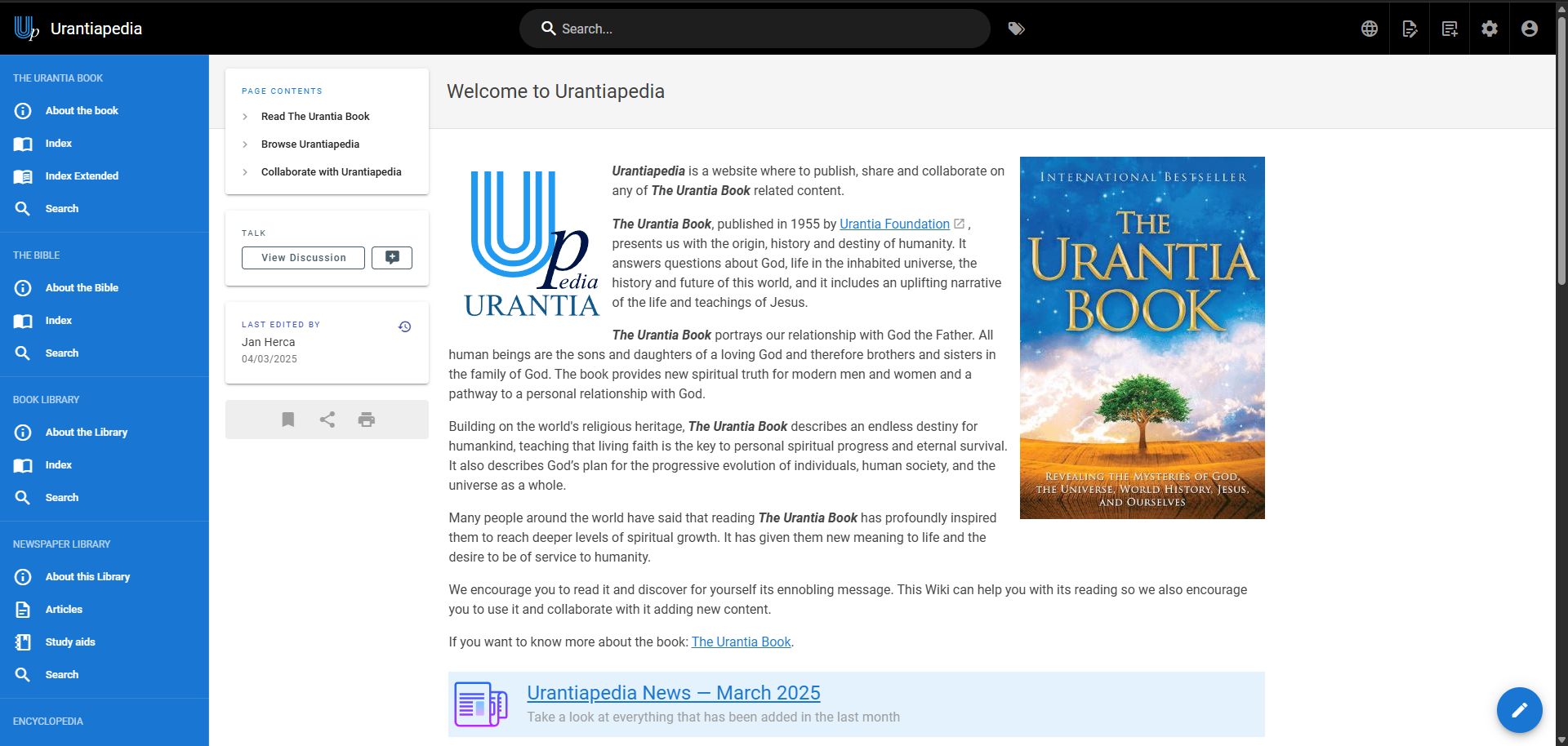
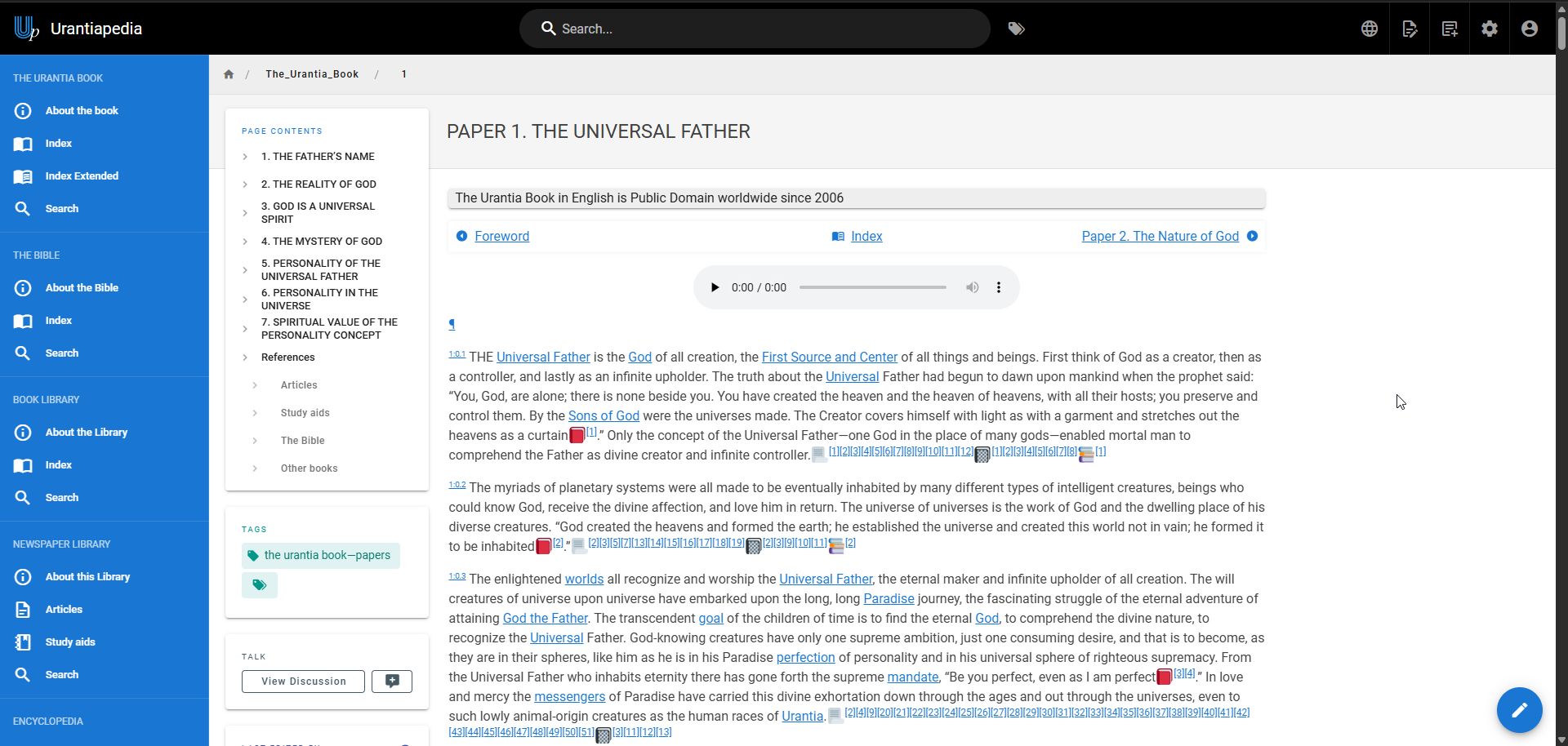
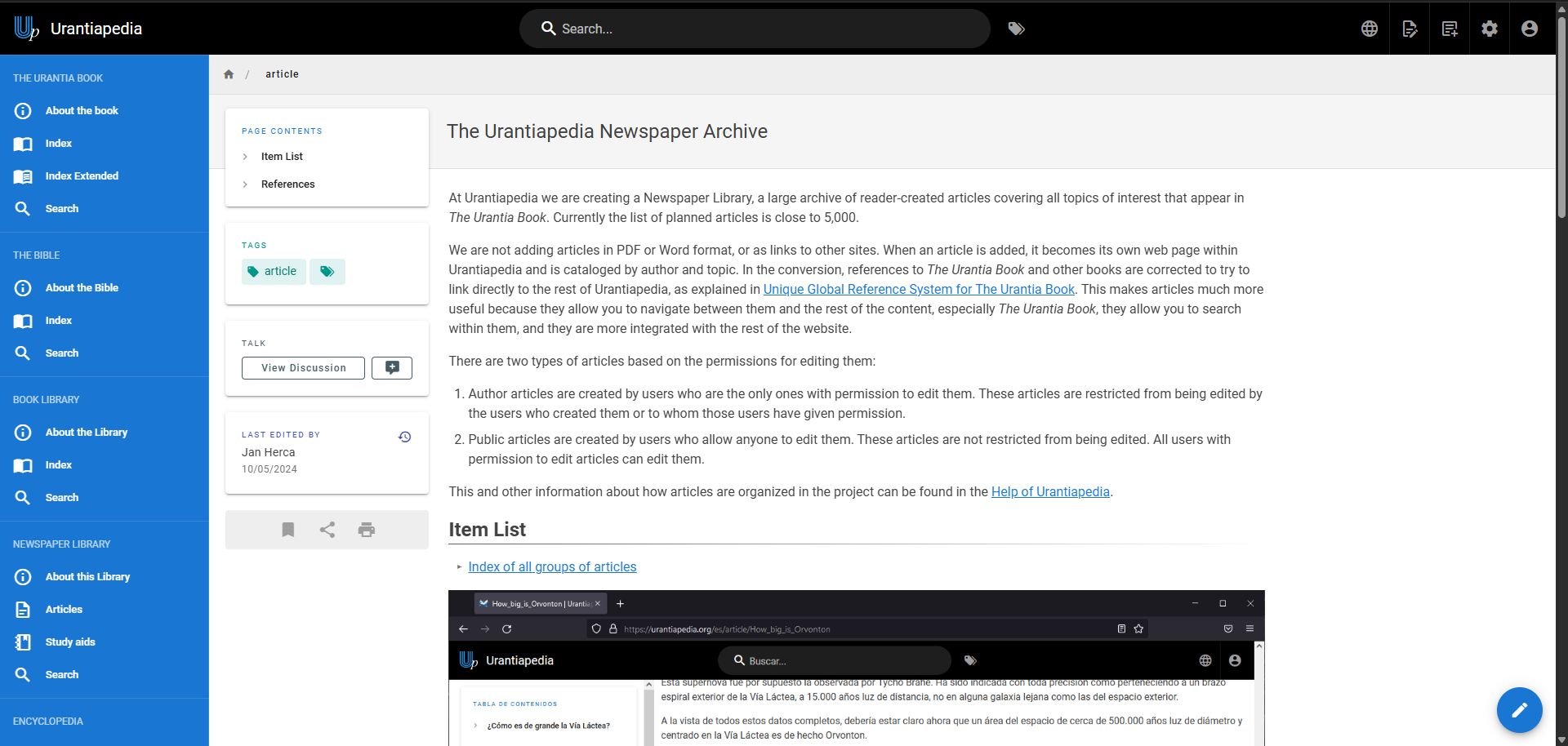
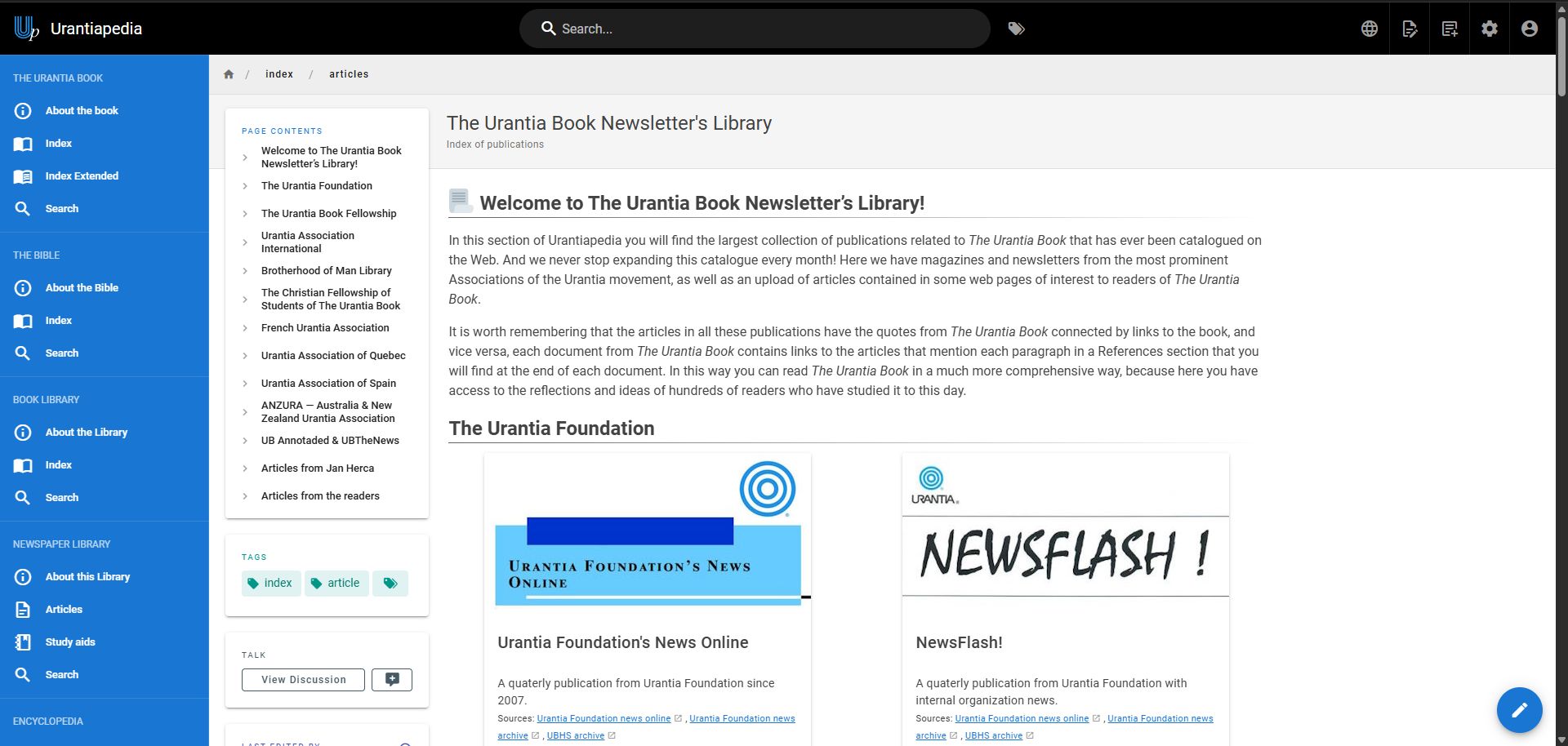
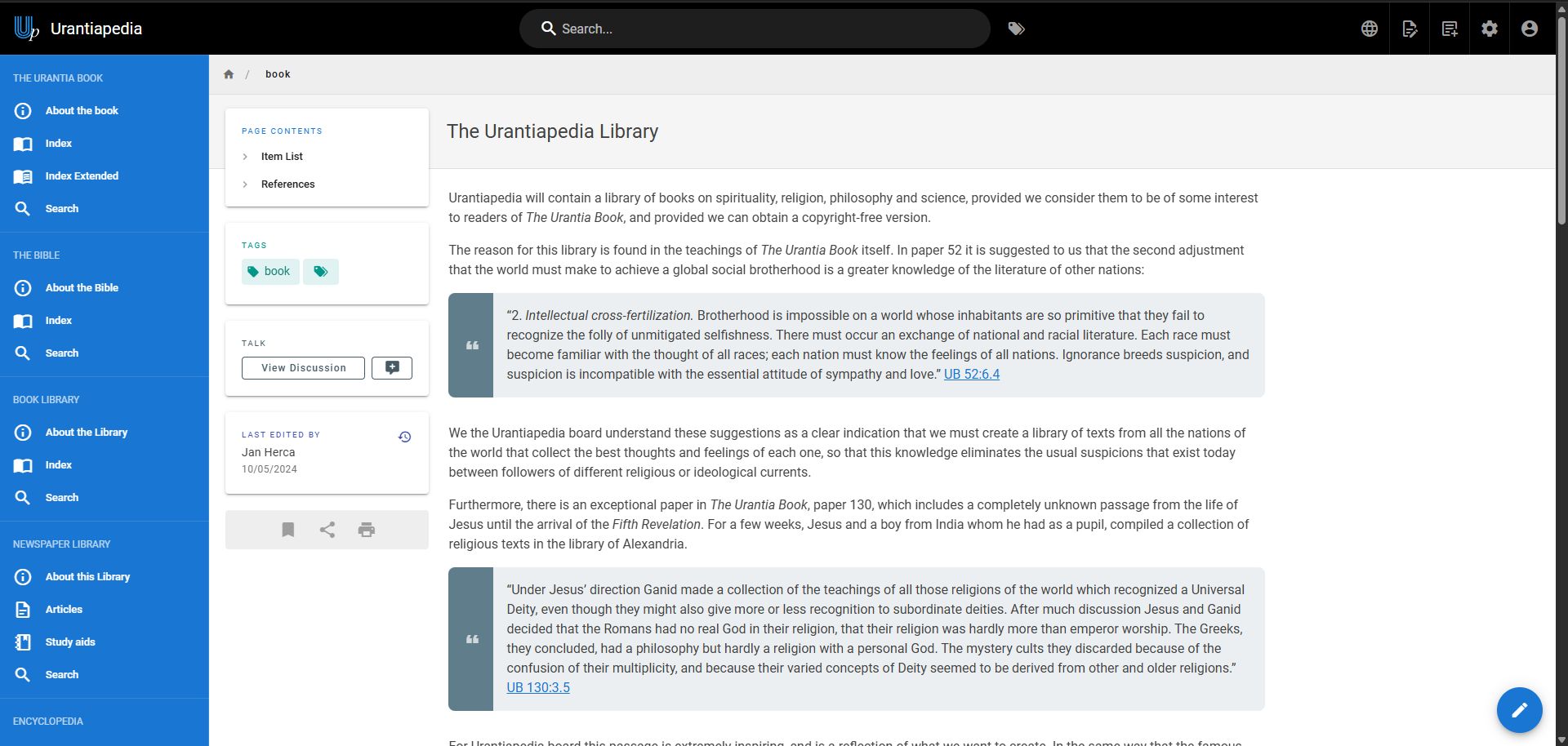
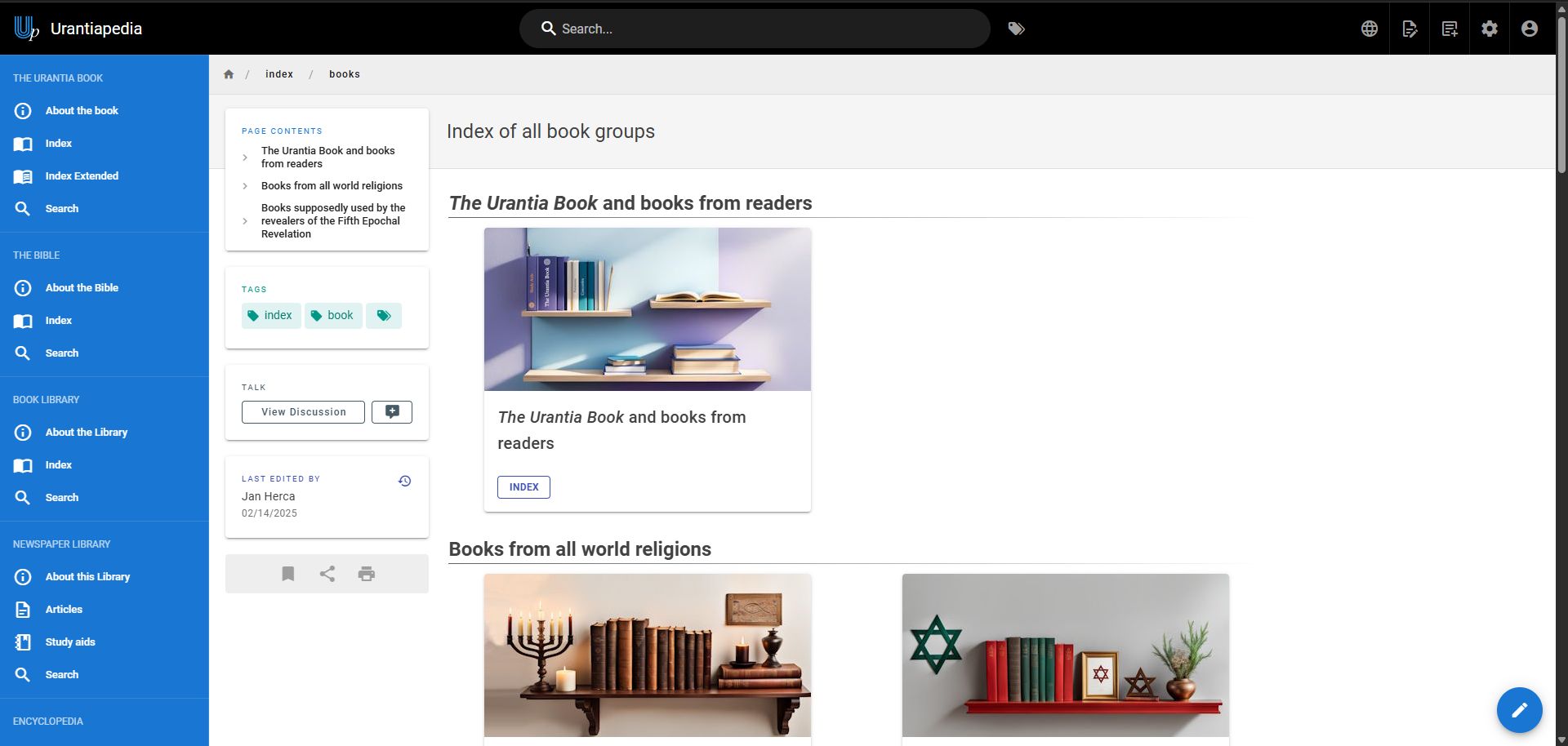
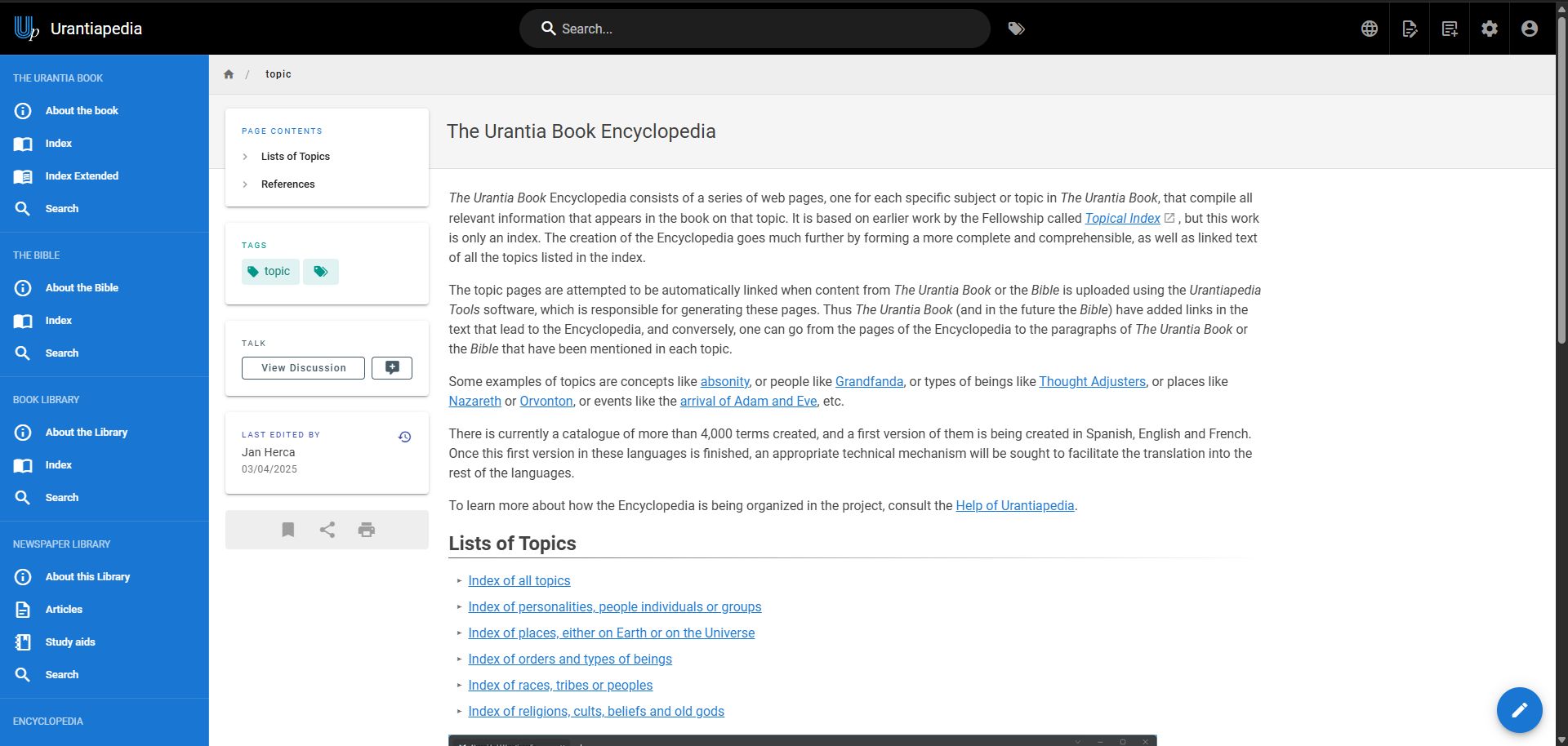
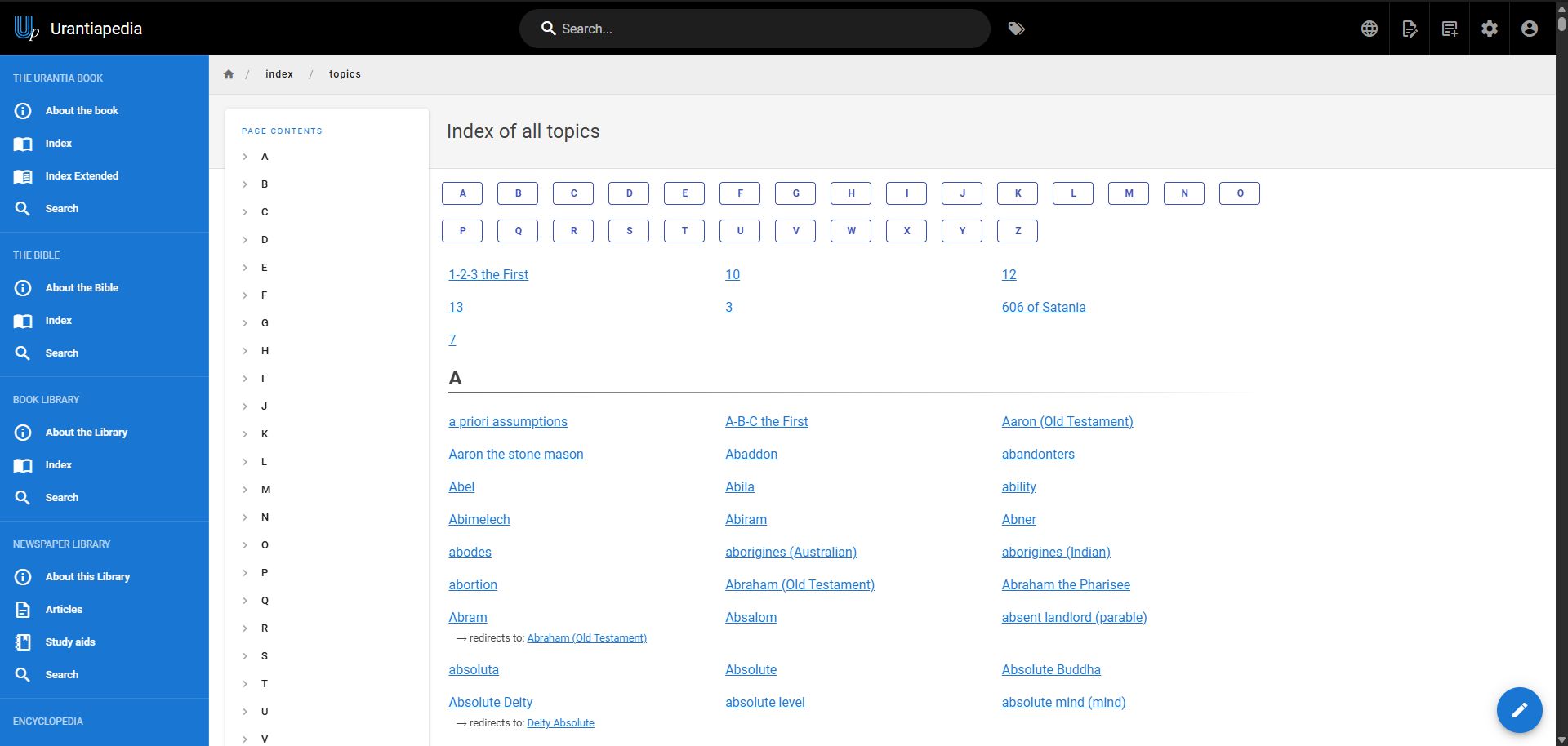
¶ Statistics
Regarding the evaluation of whether the content offered has had the expected effects, the following table shows the annual values achieved over the two years of the program.
| Google Analytics KPI Indicator | Annual Values (from April 1st, 2023 - 2025) |
|---|---|
| Total annual sessions | 31,204 |
| Total annual users | 17,596 |
| Total annual new users | 17,499 |
| Returning users | 6,276 (18%) |
| User acquisition | Organic Search (78%), Direct (18%) |
| Average engagement time | 5 min 11 s |
| Engaged sessions per user | 1.00 |
| Average engagement time per session | 2 min 55 s |
| Engagement rate | 56.33% |
| Bounce rate | 43.67% |
| Views | 103,534 |
| Number of events | 315,350 |
| Visits per user | 5.88 |
| Countries with the most visits | United States (22%), Spain (13%), Mexico (10%), Colombia (5%), France (4%), Argentina (4%), Canada (3%), Chile (2%) |
| Languages of users with the most visits | Spanish (44%), English (34%), French (7%), Portuguese, German, Turkish (and others) (2% or less) |
| Most used operating systems | Android (46%), Windows (23%), iOS (20%), Macintosh (7%) |
| Most used browsers | Chrome (65%), Safari (21%) |
As you can see, the number of annual sessions (31,204) is far from the expected 40,000, and the number of annual users (17,596) is even further from the expected 30,000. However, the charts showing the number of sessions and users show a clear upward trend, suggesting that we will be able to achieve our goals sometime this year or next if the website’s content continues to grow, especially if it expands to other languages.
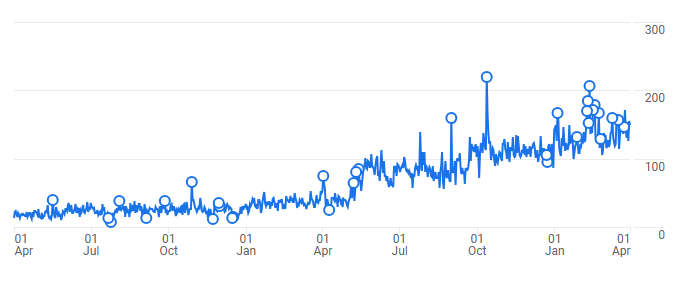
Regarding the number of returning users, we are slightly below (18%) the values we had set for ourselves (>20%). This undoubtedly calls for important reflection. Not many users feel the urge to return to the site, which indicates that there is still work to be done regarding the usefulness of the content.
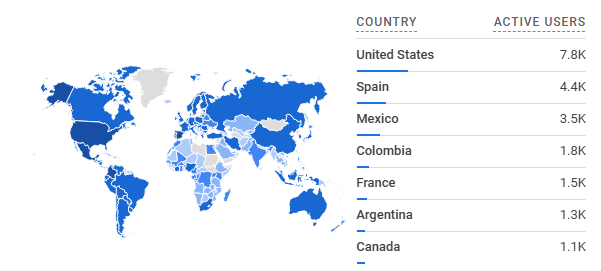
The bounce rate, which we had set as a maximum of 60%, has been achieved, with a value of 43.67%, although it is still high. We believe this is due to what we mentioned earlier: the content may be comprehensive, but its usefulness is limited, which is why many users fail to fully interact with the site.
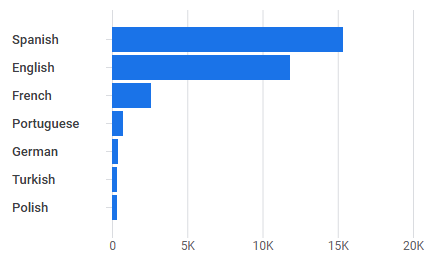
Finally, the average interaction time should have been over 2 minutes, and this has been more than met. It’s almost 3 minutes (2 min 55 s) per session, although the average time per user is still too low (5 min 11 s). We believe this time should be improved, since 5 minutes is a short reading time, and Urantiapedia is essentially a reading site. However, it can be said that this objective has clearly been more than met.
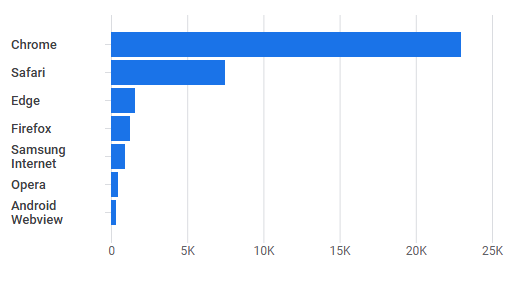
¶ Lessons Learned
¶ Regarding Content
Over the past two years, we have seen that the type of content on Urantiapedia is difficult to process. In many cases, such as the Newspaper Library, publications are only in PDF format, and the content in these files is usually not text but scanned images. We have used PDF-to-text conversion tools, but errors still occur. Scanned text may have smudges or old typography that is difficult to interpret. Text may also be in multiple columns or flow around illustrations. All of this makes it difficult to identify the correct meaning of the text, and errors often occur that must later be reviewed and corrected.
At Urantiapedia, we are making an effort to convert PDF publications to web format for an important reason. First of all, the PDF format is a proprietary format. The company that created the format has opened its use through the ISO organization to try to establish it as a standard, but it isn’t. This format creates technological dependencies that we don’t want in the project. Furthermore, its content is not “human-readable” and doesn’t allow for easy use in “version control systems”. As if that weren’t enough, it has a profound limitation: it can’t be used comfortably on smartphones. It’s a format designed for an era of paper documentation, where printing the same content on different printer models was essential. Currently, most internet content is consumed via smartphones, as can be seen in the statistics above. Smartphone users (Android and iOS) triple the number of users who use PCs. And currently, in many countries, the preference for reading on electronic devices is close to or even surpasses that of reading on paper.
For these reasons, converting PDF to web format is essential work for Urantiapedia. If we want to maintain an archive of publications related to The Urantia Book that will endure over time and be useful to readers, it is imperative to use standard markup languages created by non-commercial organizations that allow for version control and are smartphone-friendly. This is easily achieved with HTML and Markdown, which explains why 95% of the project is formatted in either of these two formats. This is also why we have included an extensive reference in Urantiapedia Help to the Markdown format, which is our preferred format.
One of the tasks we perform during the conversion from PDF to web format is to standardize the style of the content to make it easier for readers to identify elements. For example, headings, quotes, lists, and simple tables now all follow the same style to make them more identifiable. We have even adapted mathematical formulas, simple flowcharts, and footnotes as much as possible. The goal has been to obtain more maintainable content over time. To adapt this content, we sometimes have to use other standard formats such as LaTeX, SVG or Mermaid, which further complicates the process.
Last but not least, during the conversion process, we add as many links as we can, especially to The Urantia Book. This addition of links often involves slightly changing the original text because over time, references to a paragraph of the revelation have been offered in a variety of ways. For example, it has been very common, and still is, to quote The Urantia Book by simply offering the page of the original English edition, which, of course, is of no use to non-English-speaking readers. For this reason, we have decided at Urantiapedia to create a single global reference system for The Urantia Book. In all the quotations that we find not following this system, we modify the original text to accommodate the new system.
For all these reasons, the process of obtaining the content for Urantiapedia has taken much longer than expected. However, it has allowed us to learn important lessons for the future. We have found many useful tools, generated many tricks to facilitate the processes and in general we have gained experience that we can use to better plan future content expansions.
¶ Regarding the Creation of a Volunteer Team
Urantiapedia is a project of immense ambition, as it aims to bring together on a single website a wide range of content that has almost always been available in a single language. It is now expanding its availability to any language that currently has a translation of The Urantia Book. At the time of writing, 27 languages have received an official translation of the revelations. To undertake such an immense task, it would be necessary to have at least three or four contributors for each language. That would mean a team of no fewer than 100 people. And these people should at least be conversant in a translation of The Urantia Book and have a decent level of proficiency in a language other than their native language, preferably English.
It is clear that assembling such a team, given the current dissemination of the revelations, is almost an impossible mission. During these two years of the “Mustard Seed” program, we have generated tremendous interest among readers, some of whom have even joined with sporadic contributions, but all this help has been like a drop in the ocean. We are infinitely grateful for the goodwill of those who have contributed, but the work is immense and has far exceeded the help received.
The first lesson learned is that it is very difficult to sustain interest in projects as large and ambitious as Urantiapedia. Many of the people who have contributed, of course, have hundreds of other commitments that limit their job tenure.
The second, and perhaps most important, lesson is that Urantiapedia, being the development of a website, is seen as a complex project only within the reach of people with advanced computer skills. Although the reality is not exactly that, as there are dozens of tasks to perform, from simple and routine tasks to complex tasks related to programming and servers, the general perception is one of complexity. We’ve tried to counter this perception by creating an extensive help manual that details how to work and collaborate on the project. We’ve also tried to create a YouTube channel with explanations on how to collaborate. All of these efforts have been fruitless and ultimately resulted in the team being reduced to a skeleton crew.
It’s worth pointing out two circumstances that perhaps best explain the reasons for this lack of participation. The first is that the community of readers of The Urantia Book is very small. Furthermore, in addition to this, all the readers who have felt a special satisfaction in reading the book have also subsequently been compelled to undertake some dissemination work or some project based on The Urantia Book. Therefore, it is a small community, already under an enormous workload. It is understandable that a project of this size cannot easily be added to the workload already carried out by many committed readers.
The second circumstance, also important, is that, apart from the many supports that Urantiapedia has received, there are many critical voices that have expressed a certain discomfort, discontent, or at best, uncertainty about the future of a project like this. It’s worth noting that none of the three subprojects undertaken over the years have ever been implemented before: an online Newspaper Library of The Urantia Book, an online Library of Urantia Book-related books, and an online Encyclopedia. This makes us wonder if the reader community doesn’t fully approve of these projects. After all, the Newspaper Library contains thousands of articles from readers, many of them with their own biased opinions, which have certainly not been officially approved by any association; the Book Library contains books that have been selected according to Urantiapedia’s own criteria, which may not be acceptable to all readers; and finally, the Encyclopedia is a summary and interpretation of The Urantia Book, which may contain content with which not everyone agrees.
With The Urantia Book, it’s easy to fall prey to argument and conflicting points of view. The revelators strive to clarify concepts, but they are subject to limitations and a language. The interpretation of some passages inevitably leads to controversy. The Urantia Book covers hundreds of topics and is by far the largest collection of religious, philosophical, ethical, and scientific ideas ever compiled. Even so, it doesn’t contain everything about everything. There are topics that are currently hotly debated that The Urantia Book glosses over, and other topics that currently hold no interest to anyone, which the revelators dwell on profusely. Undoubtedly, creating a website that brings together all the knowledge of readers or classic writers will not be exempt from criticism. Perhaps the explanation for this difficulty in achieving greater participation should also be sought here.
¶ Vision For The Future
Of course, the Urantiapedia project is not finished with all the work done during this “Mustard Seed Program.” We are sowing the seed and watering it carefully, but there is still much work to be done. On the home page of the website, we have a note indicating that this project will probably never be completed. We must realize that The Urantia Book represents the equivalent of a second coming of the Master Jesus to Earth (so declare the revelators, UB 92:4), although without his personal presence. The amount of truth distilled in this book is of such magnitude that it will take many years and centuries to decipher and interpret. Each generation will make its contributions through more content in the form of articles, books, study aids, maps, and dozens of other things that we may not even imagine today.
The lessons learned over these two years have allowed us to better understand our future endeavors. The main challenge we must face is creating a solid, cohesive team with sufficient participation to undertake the enormous task ahead. This is undoubtedly the most important task and the pending task that should receive the greatest effort, even before considering other content. The failure in this area has made us reflect, and we must consider all options when planning how to approach the formation of this team in the coming months and years. We must make a greater effort to disseminate the project, achieve a better explanation of how it works, eliminate the complexity vision of it, and somehow encourage participation. The establishment of a community of collaborators around Urantiapedia is vital to ensuring the future of this project.
Regarding content, the biggest lesson learned is that we now have a clearer idea of the significant challenges of the project. This will be taken into account in future planning, better adjusting the timeframes and tasks to be performed. There is a lot of content with errors that we want to review, so much of the future work will be verifying existing content before creating new content.
The most important ultimate goal of this project is allowing it to continue alive and to grow constantly, even with small increments. Only by ensuring its future will we achieve a tool that will prove invaluable to future generations of readers of the Fifth Revelation.